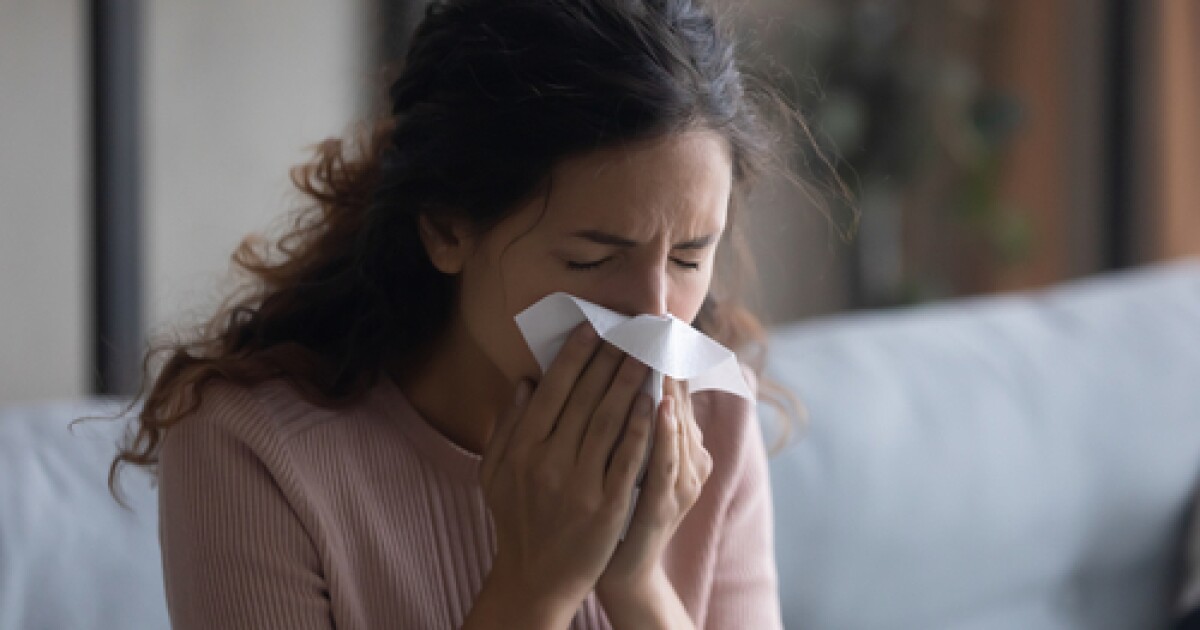Health
Prepare for Fall Allergies: Expert Tips to Find Relief

As autumn approaches, many individuals are starting to experience the onset of fall allergies. With cooler mornings signaling the change of seasons, millions are already facing symptoms such as sneezing, itchy eyes, and runny noses. This phenomenon, known as allergic rhinitis or hay fever, typically occurs when the immune system overreacts to airborne allergens, particularly pollen. One of the most significant triggers during this time is ragweed, which releases potent pollen that can travel vast distances.
Ragweed is prevalent throughout the United States, especially in the Midwest, where it can grow wild in various environments. Allergy season generally begins in August, peaks during September and October, and continues until the first hard frost. The impact of climate change has exacerbated the situation, leading to longer summers that extend the pollen season, allowing for greater pollen production. According to recent statistics, approximately 32% of adults and 27% of children suffer from seasonal allergies, highlighting the widespread nature of this issue.
Symptoms of fall allergies can vary from mild to severe and may include sneezing, itchy and watery eyes, coughing, fatigue, skin rashes, and even asthma flare-ups. To mitigate these symptoms, health experts recommend several proactive measures.
Effective Strategies to Manage Fall Allergies
One of the first steps individuals can take is to monitor pollen counts regularly. Staying indoors during peak pollen times, particularly in the early morning, can significantly reduce exposure. Keeping doors and windows closed will also help prevent pollen from entering living spaces. When venturing outside, wearing sunglasses, hats, and high-quality masks can provide additional protection, especially during yard work.
Once indoors, it is advisable to change clothes, take a shower, and wash hair to eliminate any pollen that may have clung to clothing or skin. Another critical strategy is to start allergy medications early. Experts suggest initiating treatment about two weeks before symptoms typically arise and continuing for several weeks after the first frost. Over-the-counter options, such as antihistamines, nasal sprays, and eye drops, can be effective in managing symptoms.
For individuals with more severe or persistent allergies, immunotherapy may be a viable option. This treatment, which includes allergy shots or sublingual tablets, can help desensitize the immune system, potentially reducing or even eliminating symptoms over time. Consulting a board-certified allergist is advisable for those experiencing worsening symptoms or for individuals who have not previously undergone allergy testing. These specialists can identify specific allergens and provide treatments not available over the counter, as well as develop personalized management plans.
By taking these proactive steps and seeking professional guidance, individuals can better navigate the fall allergy season, allowing for a more enjoyable experience during this picturesque time of year. With a little preparation and the right strategies, it is possible to minimize the impact of allergies and embrace the beauty of autumn.
-

 Technology4 months ago
Technology4 months agoDiscover the Top 10 Calorie Counting Apps of 2025
-

 Health2 months ago
Health2 months agoBella Hadid Shares Health Update After Treatment for Lyme Disease
-

 Health3 months ago
Health3 months agoErin Bates Shares Recovery Update Following Sepsis Complications
-

 Technology3 weeks ago
Technology3 weeks agoDiscover 2025’s Top GPUs for Exceptional 4K Gaming Performance
-

 Technology2 months ago
Technology2 months agoElectric Moto Influencer Surronster Arrested in Tijuana
-

 Technology4 months ago
Technology4 months agoDiscover How to Reverse Image Search Using ChatGPT Effortlessly
-

 Technology4 months ago
Technology4 months agoMeta Initiates $60B AI Data Center Expansion, Starting in Ohio
-

 Technology4 months ago
Technology4 months agoRecovering a Suspended TikTok Account: A Step-by-Step Guide
-

 Health4 months ago
Health4 months agoTested: Rab Firewall Mountain Jacket Survives Harsh Conditions
-

 Lifestyle4 months ago
Lifestyle4 months agoBelton Family Reunites After Daughter Survives Hill Country Floods
-

 Technology3 months ago
Technology3 months agoUncovering the Top Five Most Challenging Motorcycles to Ride
-

 Technology4 weeks ago
Technology4 weeks agoDiscover the Best Wireless Earbuds for Every Lifestyle





















